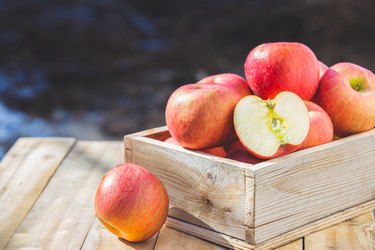
No doubt it's intriguing to think that eating an apple might ease symptoms of acid reflux or its more severe form, gastroesophageal reflux disease (GERD). But the idea that apples can stave off reflux because they absorb acid is based on an understanding of GERD that has fallen out of favor.
Apples and Reflux
Video of the Day
Eating apples won't hurt, but it's unlikely to help. "When you are actively having symptoms, you might think about eating or drinking things that will neutralize acid in the stomach or absorb the acid, but that's all theory with nothing to support it," says Will Bulsiewicz, MD, a gastroenterologist with Lowcountry Gastroenterology in Mount Pleasant, South Carolina, and author of the forthcoming book Fiber Fueled.
Video of the Day
"I think the key with diet and lifestyle is not acute management of the disease but the long game, which is to put this condition into remission to the point that you're asymptomatic, not requiring medicine and free of the illness altogether," he says.
Read more: GERD: Its Signs and Symptoms
What Really Causes GERD?
GERD affects nearly a third of U.S. adults each week, according to a December 2019 study in Gastroenterology. What's known about the condition, the most common symptom of which is heartburn — that burning sensation in the chest after eating — has evolved considerably over the last 15 years.
"The original theory was that GERD was caused by excessive acid secretion, but that hasn't really proved to be the case," Dr. Bulsiewicz says. "People with acid reflux don't produce more stomach acid than people without GERD."
A secondary theory was that the increased abdominal pressure associated with obesity caused GERD — that this pressure pushes stomach contents back up into the esophagus. "But we see plenty of skinny patients who have acid reflux, so that's also proven not to be a strong theory," he says. "Something else is going on."
The next theory is that GERD has to do with "esophageal motility," specifically that the sphincter — the muscle that keeps acids in the stomach and out of the esophagus — was lax, a condition called transient lower esophageal sphincter relaxation (TLESR).
"The bottom of the esophagus is a ring muscle, which is normally clamped and closed," Dr. Bulsiewicz explains. "When TLESR happens, it spontaneously opens, like a vent, allowing stomach contents back into the esophagus."
"Now here's where it gets really interesting," he says. "Our modern theory combines motility disturbance with a microbiome-based explanation because the motility of our intestine is based on our microbiome."
An August 2018 review in Current Gastroenterology Reports notes that there are differences in the microbiome — the mix of microorganisms — of the esophagus between people who have acid reflux and those who don't. While this may just be an association rather than a cause, other studies suggest that a plant-based and high-fiber diet can ease and possibly even eliminate GERD.
Changes That Make a Difference
One small study published in June 2018 in the World Journal of Gastroenterology found that people with GERD who took 5 grams of supplemental fiber in the form of psyllium twice a day had a significant increase in lower esophageal resting pressure and far fewer episodes of heartburn or reflux after only 10 days.
"Further evidence that supports this whole concept is a JAMA Otolaryngology-Head & Neck Surgery (October 2017) study showing a plant-based, Mediterranean-style diet outperformed medication," Dr. Bulsiewicz says.
"That's where the glimmer of hope lies — that by changing your diet and possibly supplementing with fiber, you can take control of this condition and improve it," he says. "Eating an apple does make sense because an apple can be part of that healthy diet."
Certainly apples have a lot to offer, according to the Harvard T.H.Chan School of Public Health. They're high in fiber, vitamin C and phytochemicals with antioxidant and anti-inflammatory effects. Apples have been the subject of research on type 2 diabetes, weight control and cancer. Though some studies have been mixed, overall apples are associated with positive benefits in those areas.
Bottom line: "If you eat an unhealthy diet and you eat an apple, don't expect much in the way of results," Dr. Bulsiewicz says. "But if you clean up your diet, and that includes apples and other fruits and vegetables, whole grains, seeds and nuts in a predominantly plant-based diet, you can expect a very reasonable likelihood of the improvement of this condition.
- Current Gastroenterology Reports: "The Esophageal Microbiome in Health and Disease"
- World Journal of Gastroenterology: "Fiber Enriched Diet Helps to Control Symptoms and Improves Esophageal Motility in Patients With Non-Erosive Gastroesophageal Disease"
- JAMA Otolaryngology-Head and Neck Surgery: "A Comparison of Alkaline Water and Mediterranean Diet vs Proton PUMP Inhibition for Treatment of Laryngopharyngeal Reflux"
- Harvard T.H. Chan School of Public Health: "Apples"
- William Bulsiewicz, MD, gastroenterologist, Lowcountry Gastroenterology, Mount Pleasant, South Carolina, author, Fiber Fueled
- Gastroenterology: "Prevalence of Gastroesophageal Reflux Disease and Proton Pump Inhibitor-Refractory Symptoms"
Is this an emergency? If you are experiencing serious medical symptoms, please see the National Library of Medicine’s list of signs you need emergency medical attention or call 911.